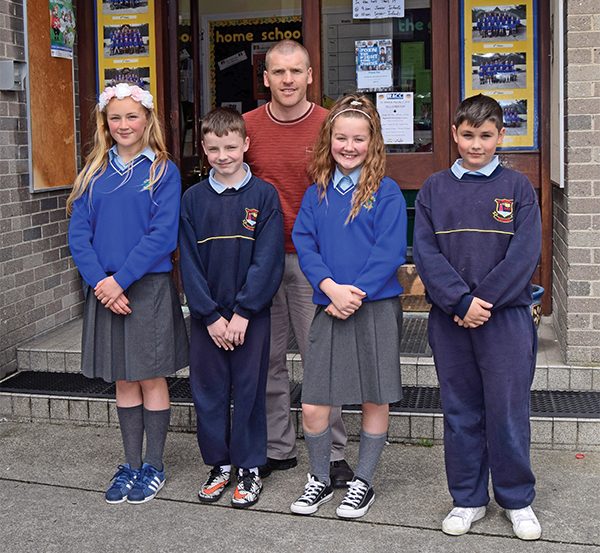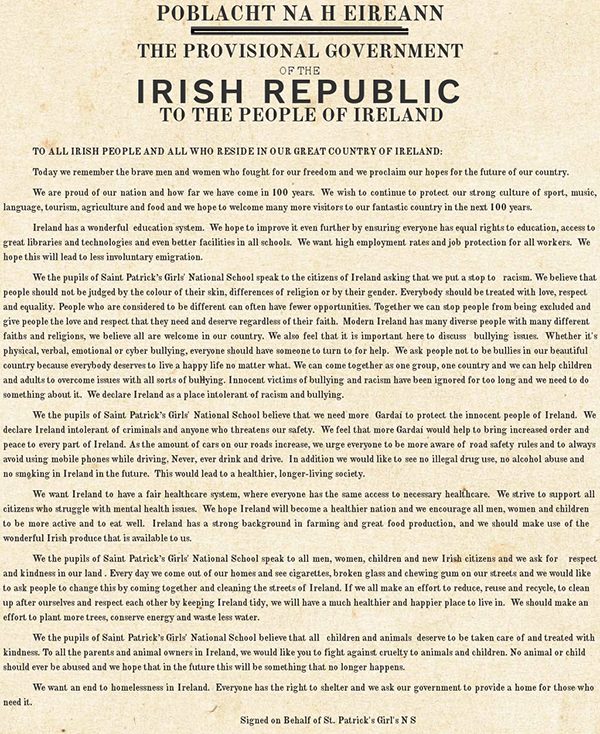
Pictured left, left to right: Katie Crilly, Richard Purdy, Donal Lahmann, Toni Daly, Josh King.
This year, as part of the 1916 centenary celebrations, March 15th was designated Proclamation Day. Every school in Ireland was invited to write a new Proclamation for 2016, using the 1916 Proclamation as a foundation. The intention was that the new Proclamation would reflect the values, ideals and aspirations of the generation of 2016.
The aim of the initiative was to assist teachers in facilitating a discussion with their students about the key themes of the 1916 Proclamation and to prompt debate on the contents of their Proclamation for 2016.
It has proven to be a very valuable undertaking, giving a real insight into the views of today’s students while creating awareness about the events of 1916.
Needless to say, the three Ringsend schools, St. Patrick’s Boys School, St. Patrick’s Girls School and Ringsend College, rose admirably to the challenge. The resulting Proclamations will give anyone who reads them hope for the future of Irish society.
There were common themes in all three documents. The students’ pride that a small country like Ireland punches above its weight on the global stage is obvious. Liam Neeson, Saoirse Ronan, Robbie Keane, Conor McGregor, Seamus Heaney and Roddy Doyle were all acknowledged as important role models.
A desire for an inclusive society which offers a warm welcome to newcomers and equal opportunities to all was in evidence too. Students want to see “an end to racism, sexism and all forms of bigotry” and a “fair society where there isn’t such a big gap between rich and poor.”
The issues that concern this generation of students were apparent. A call for “high employment rates and job protection for all workers,” an “end to involuntary emigration” and a call for “world class health care” demonstrate that the students are well aware of the challenges they face in the future.
Students from all three schools are deeply concerned about homelessness and would like to see more done to tackle it. Green issues were on the agenda too, with calls to “plant more trees, conserve energy and preserve water.” St. Patrick’s Boys school want to see “an end to the idea that the Irish are drunks” stating: “we don’t like drunkenness.”
Students worked with their teachers and had class discussions to come up with the issues that they believe are important enough to be included in the final documents. In the process they examined those issues and the impact that they have on society.
The children were already focusing on the 1916 centenary celebrations before they began the Proclamation project, with 1916 evenings which were open to the community, discussions between students, parents and grandparents about the Rising and its consequences, and a parent/student 1916 tour, which brought up issues of interest.

Below: The Proclamation by St Patrick’s Girls N.S.
Some of the students involved in the project spoke to Newsfour about how they enjoyed the process of making their own Proclamations.
Katie Crilly, a 6th class student in St Patrick’s Girls National School said, “It was very interesting making our own proclamation. I believe that we could do so much more than we have done over the past 100 years.”
Katie’s classmate, Toni Daly, agreed. Toni is confident that “if we all work for it we will achieve what we asked for.”
Both girls had the nerve-wracking task of reading their Proclamation at the 1916 Showcase, which was held in the school hall on April 27th. The students gave copies of the re-written Proclamation to parents and visitors at the showcase.
Josh King from St Patrick’s Boys National School told Newsfour that students were asked to write down what they would like to include in the final document. This led to a discussion in class about the subjects raised.
His classmate, Richard Purdy, did his research by reading newspapers to see what would make Ireland a better country before narrowing down his suggestions to the issues he believes are the most important.
The children were in general agreement about what should go into the documents, with some edits and rewrites. Home School Liaison Teacher, Mr Donal Lehmann, managed the project. He is “very impressed with how proud (of Ireland) the students are, and how positive.” He explains further that “they focused on what changes that they would like to see, not on what is wrong with the country.” He was impressed to find that the students were careful to be inclusive and to discover that “the discussions that the students had were quite topical and show that the students have a sense of what is going on in the country and what is important.”
Copies of the three Proclamations can soon be accessed on the Newsfour website and Facebook
By Jennifer Reddin



